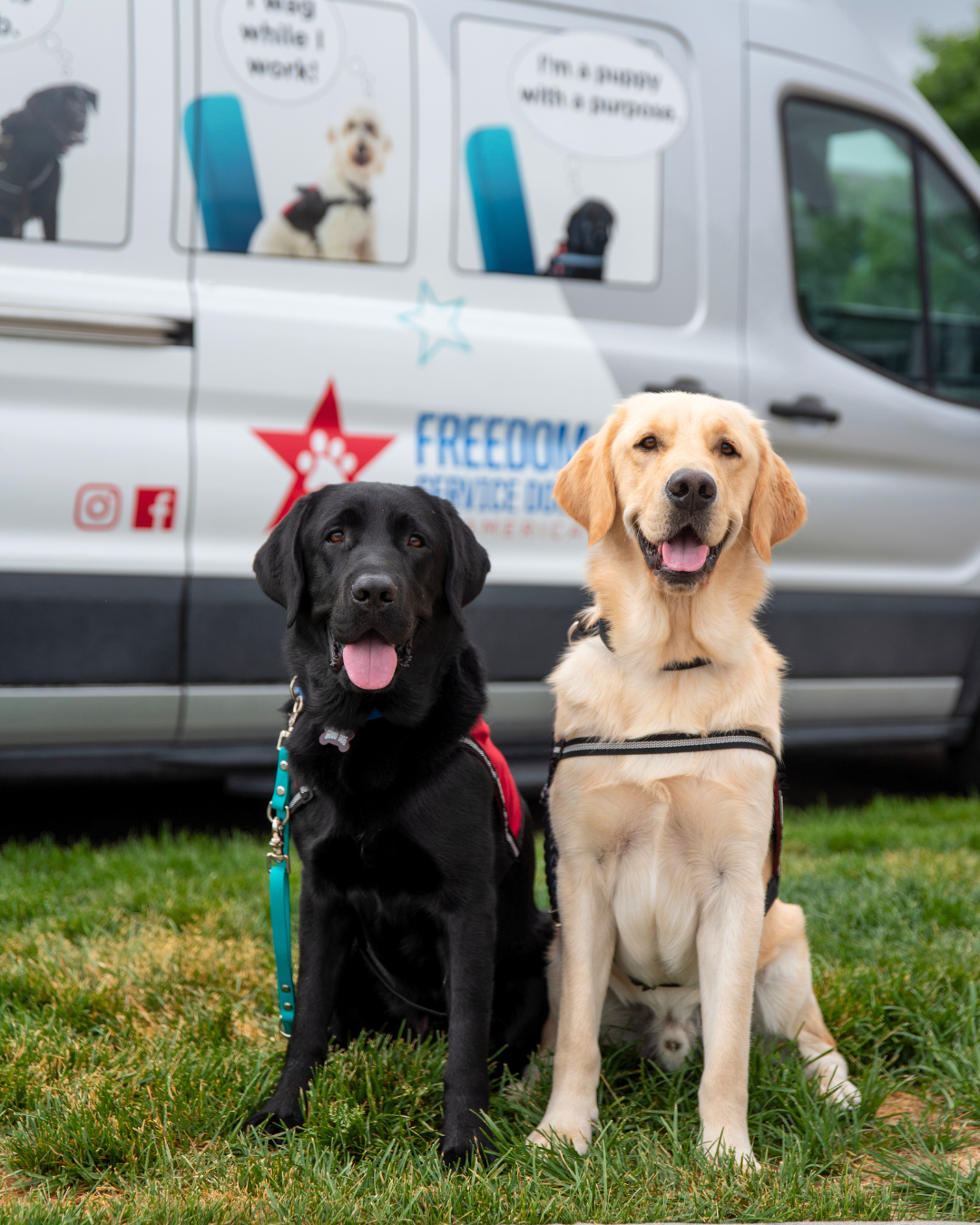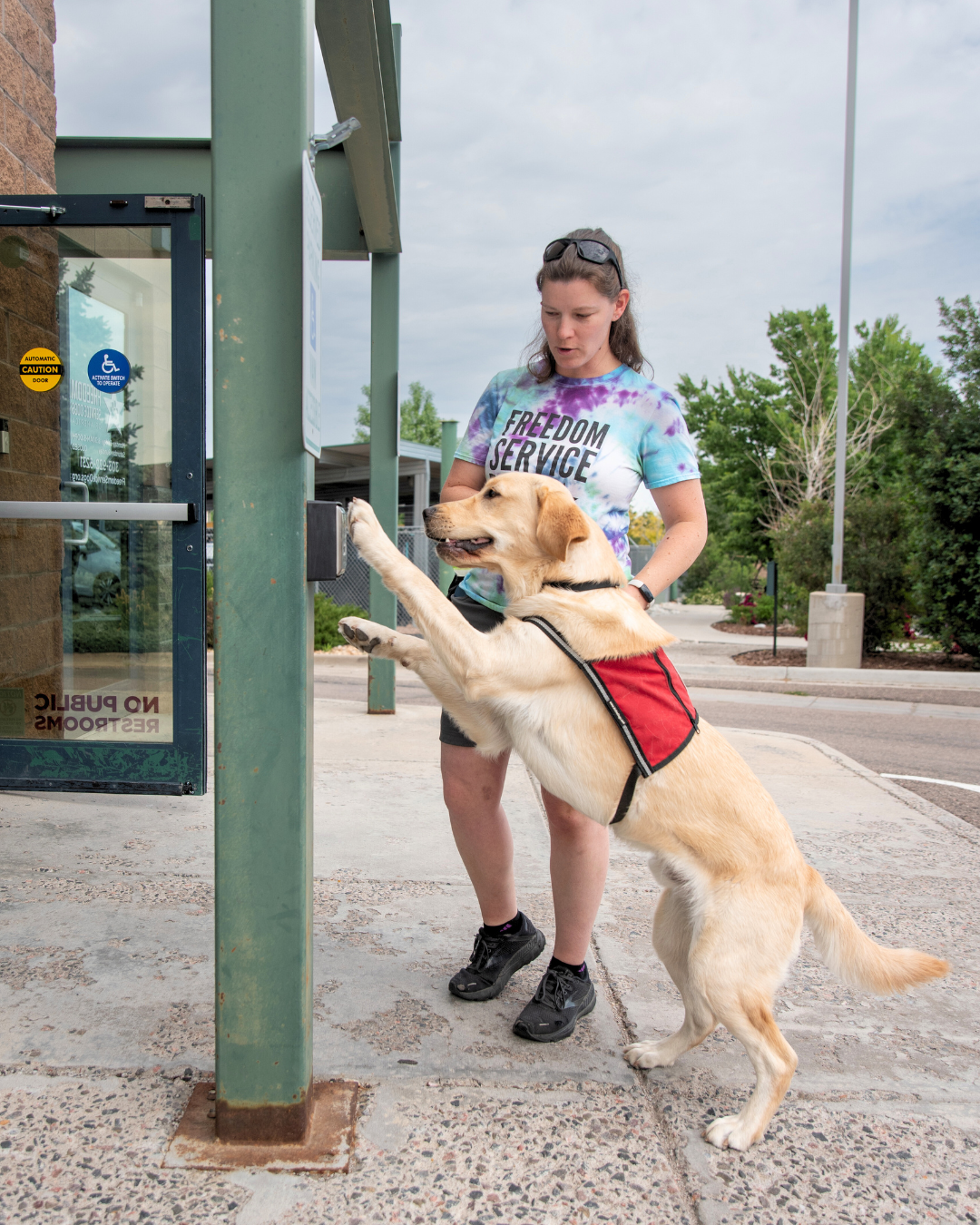Why We Use Labs
Reasons Why Labrador Retrievers Make Exceptional Service Dogs
For decades, the Labrador retriever has been ranked one of the most popular dog breeds in the United States thanks to their affectionate, friendly, and loving temperament. These exceptional qualities not only make them wonderful family companions but also ideal candidates for assistance dog work. At Freedom Service Dogs, we transform lives by partnering people with highly-skilled assistance dogs, professionally therapy dogs, and skilled companions, which is why we primarily train black, yellow, and chocolate Labs in our program. Here is an exploration of the unique attributes that make the beloved Labrador retriever the ideal choice for FSD Service Dogs.

They have ideal temperaments.
Labrador retrievers consistently exhibit an ideal temperament that complements the unique needs of the people we serve, which includes veterans with PTSD, children with autism and neurodevelopmental disabilities, and adults with physical challenges. Their outgoing, eager to please, observant, and highly affectionate personalities make them adept at providing comfort and joy to their human partners. Adds Jenna Faria, FSD’s Reproductive and Genetics Manager, “Labs make excellent service dogs due to their intelligence, trainability, friendly nature, and versatility. Their loyalty, even-tempered personalities, resilience, and willingness to work contributes to their effectiveness in various assistance dog roles.”
The Labs’ typical friendly demeanor and love of human affection also make them incredible professional therapy animals. Working alongside human services professionals, such as law enforcement officers, counselors, therapists, and social workers, therapy dogs help children, teens, and adults feel calmer and more self-assured. Isanti County Investigator Sean and his FSD Professional Therapy Dog Cooper, a dedicated yellow Lab with a huge heart, make a lasting difference in their community every day. Born to help others with his sweet and mellow temperament, Cooper works alongside Sean to provide comfort and a communication bridge with members of their community in crisis during tragedies, at large community gatherings, and more. He also serves as a grounding presence and helps build confidence in victims who have a difficult time testifying in court.

They love to work and are highly trainable.
Labrador retrievers have an innate desire to work and please their human companions. Originally bred to work alongside human partners in fields and on water, Labs are born with a natural love of learning new things. Intelligent and food-driven, they are particularly responsive to training using the positive reinforcement methods employed at FSD. Not only do they effectively perform tasks and learn new cues quickly, but they do so with a happy, wagging tail. When they’re not working, they seamlessly transition to living as adaptable, happy-go-lucky dogs.
Assistance dogs can learn over 60 cues and perform tasks that help individuals in a variety of ways. Some are trained to alert to medical episodes, while others are trained to interrupt anxious behaviors, find help, or support someone’s balance. At FSD, we purpose-breed and custom-train service dogs who assist their human partner by performing tasks such as retrieving items, opening doors, interrupting nightmares or flashbacks, creating space in public, and more.
They’re the optimal size for effective task performance.
Labrador retrievers have the added benefit of their size. Typically weighing an average of 55 to 70 pounds, the Labs in our program are equipped with an optimal combination of height and strength for effective task performance. “They tend to be medium-sized dogs that can easily do tasks such as putting their paws up on taller counters, pulling and holding doors open, and performing proprioceptive and grounding tasks,” notes Allison Peltier, Deputy Director of Operations at FSD.

We have a wealth of genetic information.
FSD launched its own in-house breeding program in 2020, which has allowed us to focus our efforts on breeding Labs, golden retrievers, and crosses of the two with tried-and-true genetics and temperaments. Our commitment to producing happy, healthy, and predictable service dogs is significantly aided by the wealth of genetic information available on Labs. By partnering with other service and guide dog schools with purpose-breeding programs, such as Guide Dogs for the Blind, we are able to diversify our genetic pool and increase the odds of a puppy having a more desirable temperament for service work. According to Faria, “Their well-documented genetics allow for informed, ethical breeding decisions, ensuring desirable traits such as good health, intelligence, trainability, and a calm temperament are passed down. This helps us maintain and enhance the qualities that make Labradors exceptional service dogs, promoting the well-being and effectiveness of future generations in assisting individuals with diverse needs.”
Learn more about our custom-trained Freedom Service Dogs, Professional Therapy Dogs, and Skilled Companions.
Contact Erin Conley at econley@

